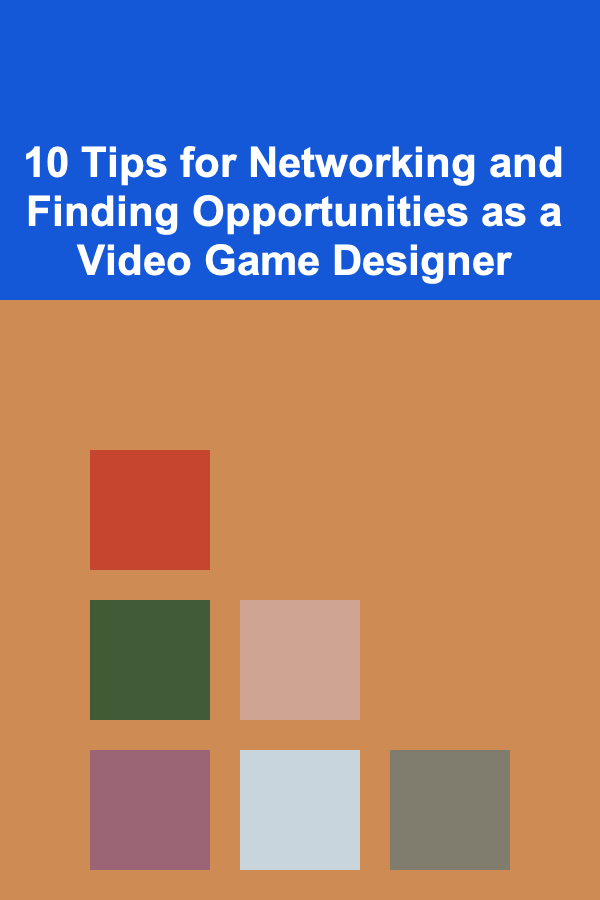
10 Tips for Networking and Finding Opportunities as a Video Game Designer
ebook include PDF & Audio bundle (Micro Guide)
$12.99$11.99
Limited Time Offer! Order within the next:

Breaking into the video game industry as a designer is both thrilling and challenging. The industry is highly competitive, fast-evolving, and often requires more than just talent---you need connections, a strong portfolio, and an understanding of how to position yourself effectively. Networking and discovering opportunities are essential steps that can make or break your career. This article dives deeply into ten practical, actionable tips to help video game designers build their network, find opportunities, and accelerate their careers.
Understanding the Landscape of Video Game Design
Before diving into the tips, it's important to understand the video game design landscape. Video game design encompasses various roles, including gameplay designers, level designers, narrative designers, systems designers, user experience (UX) designers, and more. Each role requires a different skill set, but all benefit from strong communication, collaboration, and creativity.
The industry is decentralized; studios range from giant AAA companies to indie developers working in small teams or solo. This means networking strategies can vary depending on your career goals. You might want to work at a big studio, launch your own indie game, or become a freelance designer. No matter your path, networking and opportunity discovery are pivotal.
Build a Strong, Focused Portfolio
Your portfolio is your first impression and often the key to getting noticed. It should not only showcase your technical skills but also your creativity and problem-solving abilities.
- Tailor your portfolio: Highlight projects that emphasize your design philosophy and skills related to the roles you want.
- Include case studies: Explain your design choices, challenges, and solutions. This demonstrates critical thinking and communication skills.
- Update regularly: Keep your portfolio fresh with your latest projects, including game prototypes, mods, or levels you've designed.
- Show versatility and specialization: If possible, demonstrate your ability in different design areas (e.g., mechanics, narrative) or highlight your specialized niche.
- Use platforms like Itch.io, GitHub, or a personal website: Make your work accessible to recruiters and peers.
Networking often starts with your portfolio because people want to see what you can do before investing time in conversations or referrals.
Leverage Online Communities and Social Media
The video game community thrives online, making virtual networking a powerful tool.
- Join specialized forums and Discord servers: Sites like TIGSource, Polycount, and Reddit's /r/gamedev have active, supportive communities.
- Participate in game jams: Platforms like itch.io host jams where you collaborate under tight deadlines. These events are goldmines for networking.
- Engage on Twitter and LinkedIn: Follow and interact with industry professionals, studios, and influencers. Share your work and insights regularly.
- Show your process: People connect with stories and behind-the-scenes content.
- Be genuine and helpful: Offer feedback on others' projects, share resources, and contribute meaningfully to discussions.
Consistency and authenticity build trust and make you memorable.
Attend Industry Events, Conferences, and Meetups
While online networking is crucial, face-to-face interactions at industry events can accelerate your career growth.
- Conferences like GDC (Game Developers Conference), PAX, and IndieCade: These are hubs for meeting developers, publishers, and recruiters.
- Local meetups and game developer groups: Smaller, local events can be less intimidating and more intimate.
- Prepare: Have a concise pitch about who you are and what you do. Bring business cards or digital contact methods.
- Follow up: After meeting people, send a personalized message to keep the connection alive.
- Volunteer: Volunteering at events can give you backstage access and deepen your network.
Events are great for building relationships that can lead to job referrals or collaborations.
Collaborate on Projects and Join Teams
Experience and teamwork are crucial in game design. Collaborating helps you grow skills, build your network, and create tangible work.
- Join indie teams or hobby projects: Many teams seek designers; contributing to these projects can lead to long-term partnerships.
- Contribute to open-source or modding communities: This shows your ability to work with existing codebases and content.
- Use collaboration tools: Familiarize yourself with platforms like GitHub, Trello, or Slack for smooth project management.
- Be reliable and communicative: Your reputation depends on how you work with others.
- Document your contributions: Keep track of your role and outcomes for your portfolio.
Collaboration exposes you to diverse perspectives and connections.
Connect with Mentors and Industry Veterans
Mentorship can provide guidance, feedback, and access to hidden opportunities.
- Identify potential mentors: Look for professionals whose careers you admire or who work at companies you want to join.
- Approach respectfully: Send a thoughtful message expressing why you value their expertise and what you hope to learn.
- Be specific in requests: Whether it's portfolio reviews, career advice, or skill development, clear asks show professionalism.
- Show progress: Apply their advice and share results; mentors appreciate engagement.
- Attend "Ask Me Anything" sessions: Platforms like Twitter and Discord host AMA events with industry pros.
Mentors often become advocates who can open doors in your career.
Utilize Job Boards and Talent Platforms Strategically
Finding job openings is easier when you know where to look and how to stand out.
- Specialized job boards: Sites like Gamasutra (now Game Developer), ArtStation Jobs, and Hitmarker focus on game industry roles.
- Company career pages: Follow studios you want to work with and check their listings regularly.
- LinkedIn: Use tailored searches, set alerts, and network with recruiters.
- Recruitment agencies: Some specialize in gaming roles and can match you with positions.
- Customize your applications: Tailor your resume and cover letter for each role, emphasizing relevant experience.
Don't just apply; follow up and connect with the hiring managers or employees for better chances.
Master Communication and Interpersonal Skills
Technical skills matter, but soft skills often differentiate great designers.
- Practice clear and concise communication: Whether in emails, presentations, or meetings, clarity is key.
- Develop active listening: Understanding team needs and feedback improves your work and relationships.
- Embrace feedback: Show openness and professionalism when receiving critique.
- Network with empathy: Build genuine connections rather than transactional ones.
- Learn conflict resolution: Game development is collaborative and sometimes stressful---your ability to navigate conflicts constructively is valuable.
Strong interpersonal skills make you a desirable collaborator and employee.
Stay Current with Industry Trends and Tools
The game industry evolves rapidly; staying informed shows your commitment and foresight.
- Follow industry news: Websites like Kotaku, Polygon, and Gamasutra cover major trends.
- Learn emerging tools and software: Engines like Unity and Unreal, design tools like Figma or Twine, and scripting languages can boost your marketability.
- Explore new platforms and genres: Understanding mobile, VR, or live service games expands your opportunities.
- Take courses and certifications: Online platforms such as Coursera, Udemy, and specialized game design schools offer valuable resources.
- Share insights: Blogging or creating videos about trends positions you as a knowledgeable professional.
Employers value candidates who can adapt and innovate.
Build a Personal Brand and Online Presence
Your brand is how people perceive you professionally.
- Create a professional website: Include your portfolio, resume, and contact info.
- Engage in content creation: Write articles, record videos, or stream game design sessions.
- Be consistent: Use the same name, style, and message across platforms.
- Highlight your unique strengths: Whether it's narrative design, level creation, or UI expertise, carve out your niche.
- Network through content: Sharing valuable content attracts peers and recruiters.
A strong personal brand makes you stand out in a crowded market.
Be Persistent, Patient, and Open-Minded
Finally, remember that building a network and career takes time.
- Expect setbacks: Rejections and delays are part of the process.
- Keep learning and improving: Treat every experience as growth.
- Be open to different roles and projects: Sometimes unexpected opportunities lead to valuable experience.
- Maintain relationships: Stay in touch with contacts even when you're not job hunting.
- Celebrate small wins: Each connection or project contributes to your long-term success.
Persistence combined with flexibility often leads to breakthrough moments.
Final Thoughts
Networking and finding opportunities as a video game designer is a multi-faceted, ongoing journey. It requires deliberate effort in building relationships, showcasing your skills, staying current with industry shifts, and maintaining a professional attitude. By applying these ten tips consistently, you can increase your visibility, create meaningful connections, and open doors to exciting projects and career growth.
The game design community is vibrant and supportive, and those who invest in networking alongside their craft are often the ones who thrive in this dynamic industry. Start today, stay curious, and keep designing the games that inspire you.
If you'd like, I can also help draft a detailed action plan or sample outreach messages tailored for video game designers!
Reading More From Our Other Websites
- [Home Storage Solution 101] How to Child-Proof Your Cleaning Supply Storage: Safety First!
- [Home Space Saving 101] How to Create the Illusion of More Space in Your Home
- [Organization Tip 101] How to Set Up a Family Command Center for Organization
- [Personal Care Tips 101] How to Make Face Masks a Part of Your Morning Routine
- [Home Renovating 101] How to Plan a Home Renovation Timeline and Stick to It
- [Organization Tip 101] The Future of Smart Home Accessibility: What's Next?
- [Mindful Eating Tip 101] From Chaos to Calm: How a Mindful Eating Journal Template Boosts Food Awareness
- [Home Staging 101] How to Maximize Small Spaces Through Effective Staging
- [Home Lighting 101] How to Achieve Flawless Makeup with the Best Vanity Lighting Tips
- [Personal Care Tips 101] How to Layer Hair Mousse with Other Styling Products

How to Build a Career in Financial Modeling
Read More
How to Cut Unnecessary Expenses Without Sacrificing Quality
Read More
How to Plan a Home Renovation Budget That Won't Break the Bank
Read More
How to Create a Charitable Giving To-Do List for End-of-Year Tax Planning
Read More
How to Create a Drawing Checklist for Architectural Illustration
Read More
10 Tips for Eco-Friendly Errands: A Checklist Guide
Read MoreOther Products

How to Build a Career in Financial Modeling
Read More
How to Cut Unnecessary Expenses Without Sacrificing Quality
Read More
How to Plan a Home Renovation Budget That Won't Break the Bank
Read More
How to Create a Charitable Giving To-Do List for End-of-Year Tax Planning
Read More
How to Create a Drawing Checklist for Architectural Illustration
Read More